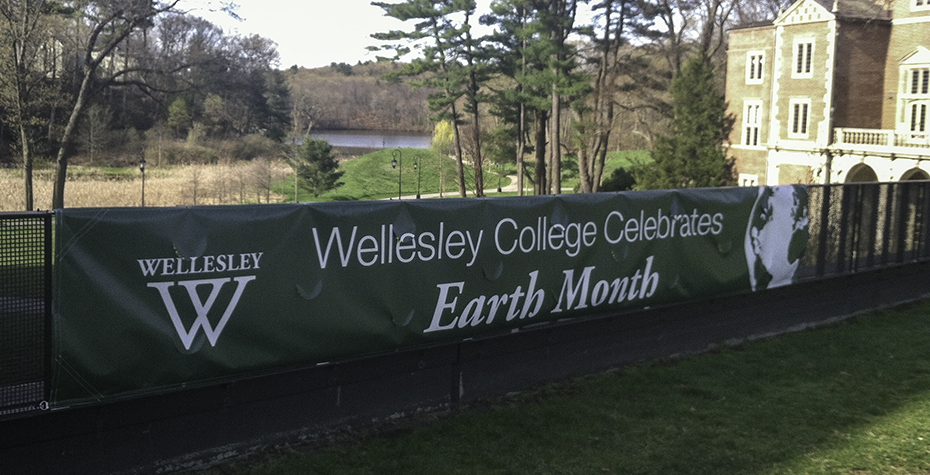April is Earth Month and Wellesley has had a lot to celebrate this year

Wellesley had much to celebrate during Earth Month this past April, including a recent mention The Princeton Review’s Guide to 322 Green Colleges. The College also recognized the work of one group of students who aim to make Wellesley a pioneer in the effort to reduce waste.
Starting on January 1, 2014, Massachusetts state regulations will require that institutions producing more than 1 ton of food waste per week to compost that waste. In order to meet those regulations, Wellesley turned to the experts it knew best: its students. The project for devising college-wide compost solutions was given to the Environmental Studies capstone course ES300, under the direction of Beth DeSombre, Camilla Chandler Frost Professor of Environmental Studies and director of the Environmental Studies program.
The 21 enrolled students formed data collection and analysis groups on different approaches as well as a leadership team that is responsible for strategic planning. “The course really is not run like a class so much as a consulting team,” explained Morgan O’Grady ’13, who majors in Environmental Studies. “Beth provides direction and insight into the processes that are necessary for completing the project, but decisions are made as a class.”
The five reduction options and 12 diversion options that the students examined include off-campus compost piles, donating food to people and to pigs, and small-scale vermicomposting, among others. The class analyzed the benefits of each option from several perspectives. The environmental impact of each option is considered, including the effects on human health hazards and the climate change potential. Students looked at the social impact of these options, “such as the shift in terms of campus experience,” O’Grady explained, “the difficulty of implementation, or the social justice benefit or detriment of a method.”
Cost evaluation also plays an important factor in the students’ proposals. “We aren’t emphasizing any category over another,” said O’Grady, “but we are encouraging the College to weigh environmental costs as heavily as financial costs, in accord with our sustainability statement.”
“In all the years I've taught ES300,” said Professor DeSombre, “I've never had such a successful project. The data collection and analysis the students have been doing is absolutely amazing. It has required a lot of work, using a lot of complicated tools, and the students have been in charge of the design of the project and all aspects of it from the beginning. I'm so impressed with the work they've done and have a lot of confidence that the results will provide excellent guidance for the decisions the College has to make.”
The students presented their initial findings at the Ruhlman Conference, to an audience which included President H. Kim Bottomly. In May, the class will present their findings to the Massachusetts Department of Environmental Protection to explore the possibility of using the ES300 study as a model for organic waste diversion at other universities.
Professor DeSombre said, “This course is a great model for what we're trying to accomplish in the environmental studies program: bringing together many different types of tools and analysis to understand and figure out what to do about environmental problems; doing that kind of interdisciplinary work is extremely difficult, but when you do it well it is worth the effort: the results tell you something you wouldn't have known by looking at any one aspect -- science, or policy, or ethics, for instance -- alone.”
For more about sustainability initiatives, visit the Wellesley Wire where you can meet Randelle and Margo, two students enrolled in the Babson-Olin-Wellesley Three College Collaboration Sustainability Certificate program.
- Gabrielle Linnell '13
